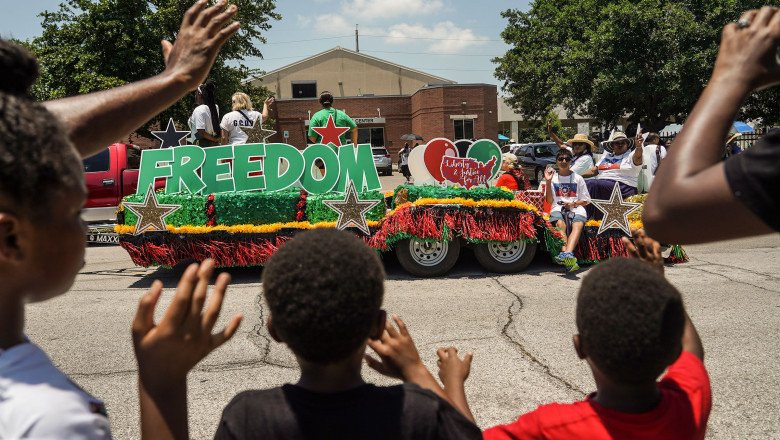
views
Juneteenth represents the long-delayed freedom of enslaved Black people in the United States.
But Juneteenth isn’t just a day to celebrate. For me, it’s a marker—a moment to remember what came right after emancipation. Because every time Black people in this country have pushed forward toward freedom and justice, something has stepped up to push back. That pushback is the unfinished business of American democracy, and it’s playing out right now.
Advertisement
Advertisement
After the Civil War, the promise of Reconstruction was real. Newly-freed Black people voted, ran for office, built institutions, and claimed their rights. But the backlash was swift and violent. The Ku Klux Klan wasn’t just a fringe group—it was an organized force, often aided by local power structures, meant to terrorize Black communities and preserve white supremacy. Klan members and others didn’t just attack in the streets; they infiltrated sheriffs’ offices, courts, and local governments. Their ideology seeped into institutions designed to protect justice. Reconstruction was ultimately undermined by this collusion—laws without enforcement, rights without protection.
That same pattern is echoing today. Investigations have revealed that hundreds of individuals affiliated with extremist groups—like the Oath Keepers and Three Percenters—have served in law enforcement or the military. Members of the Oath Keepers and Proud Boys were convicted for their roles in the January 6 insurrection. Pardons have been granted and these repeated public calls for clemency have sent a message: some groups can act with impunity.
Advertisement
Today, a long tradition of white supremacist ideology undermines public safety and provides permission for violence.
It’s important to distinguish between white nationalism and white supremacy. White nationalism is an organized, ideological push for a white-only nation—groups like the Proud Boys and Oath Keepers fit this mold. White supremacy is the broader system that maintains racial hierarchy and inequality through laws, culture, and institutions. White nationalists exploit and reinforce that system while posing a direct threat to democracy and multiracial belonging.
White supremacist forces during Reconstruction used law and policy to strip Black people of newly gained rights. Today, white nationalist movements aim to reshape who belongs in America by targeting the most vulnerable. Their ideology isn’t confined to rallies or fringe forums—it’s embedded in policy agendas that echo past efforts to define citizenship narrowly and weaponize government systems to exclude. Nowhere is this clearer than in the realm of immigration enforcement.
Advertisement
In recent months, large-scale immigration enforcement actions have devastated immigrant and refugee communities. These aren’t just isolated policy decisions—they are calculated assaults on the rights that Americans have fought for over generations. When white nationalist-aligned forces attack birthright citizenship, they’re not just targeting immigrants. They’re threatening the 14th Amendment—a cornerstone of post-slavery constitutional protection that guards us all against second-class status.
These attacks are connected. Immigration raids, voter suppression laws, and attacks on educational freedom are part of a broader effort to redraw the lines of who belongs in America and to weaponize citizenship as a tool of exclusion. It’s a dangerous project that strikes at the heart of multiracial democracy.
In response, business owners, faith leaders, and civil society groups have organized legal challenges, rapid-response networks, and public campaigns. These acts of resistance echo the original spirit of Juneteenth—not just surviving, but fighting back.
Advertisement
But the danger doesn’t end with extremist groups. The deeper threat lies in the systems that allow them to thrive—flawed hiring practices, opaque oversight, and policies that enable racial profiling and targeted enforcement. It’s the machinery of mass incarceration, deportation, and over-policing which is still disproportionately aimed at Black and Brown communities.
This is why Juneteenth matters beyond symbolism. It’s a call to vigilance and collective power. The fight for Black freedom and dignity is fundamental to any functioning democracy. When Black people are free—when our rights are secure—everyone moves closer to a society of shared voice, safety, and belonging.
Each of us has a role in this long, disciplined struggle. We must organize from the ground up. We must educate our communities, demand transparency, and build new systems rooted in justice—whether that means ending harmful immigration practices, exposing extremist ties in public agencies, or investing in alternatives to punitive policing.
Advertisement
When white supremacy infiltrates law enforcement and federal agencies, it doesn’t just harm those directly targeted—it undermines democracy itself. Defending democracy means rejecting that infiltration and choosing to build something better, together.
So, as we mark Juneteenth this year, let’s carry two truths: a clear-eyed understanding of history’s hard lessons and a fierce commitment to action. The freedom Juneteenth commemorates was never a finish line. It was always a starting point.
If we answer that call—if we organize with intention, demand accountability, and center the long arc of Black struggle to build one nation, with liberty and justice for all—we can build a future where Juneteenth’s promise is fulfilled for every person who calls this country home.
https://time.com/7295731/juneteenth-fight-for-freedom/























Comments
0 comment